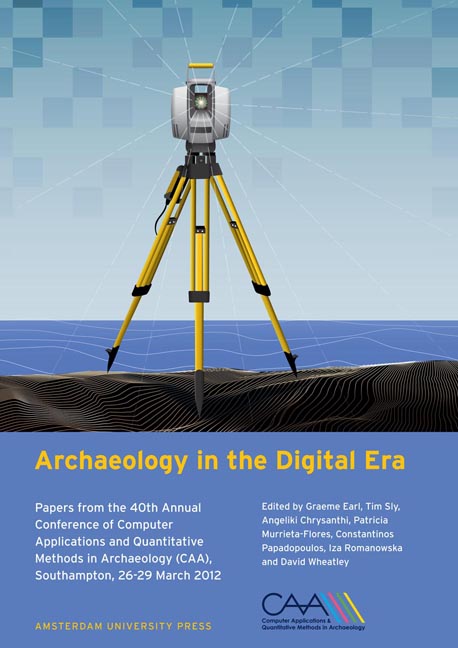 Archaeology in the Digital Era
Archaeology in the Digital Era Why Hunter and Gatherers did not Die More Often? Simulating Prehistoric Decision Making
Published online by Cambridge University Press: 16 February 2021
Summary
Abstract:
We have created a computer model of economic and social cooperation among hunter-gatherers that simulates how prehistoric people survived. This is an agent-based model in which agents simulating hunter-gatherer households move through a territory for resources irregularly distributed. The probabilities of their survival not only depend on the availability of resources but on the probability to establish cooperation links with other agents in such a way that the quantity of labor is enhanced and the probability of success in hunting increases. We expect to be able to discern if survival is conditioned by social decisions only, or if it is the result of the constraints on mobility generated by geography and the irregular distribution of resources, both in space and time. Results suggest that small sized groups (less than 10 families) died by starving when agents could not build a high enough number of social ties with other groups. Cooperation appears to be filtered by the specific social (cultural) identity of agents, a parameter that changes constantly, because it is being negotiated at run time as a consequence of previous stances of successive cooperation.
Keywords:
Hunter-Gatherer, Economic Decision Making, Social Reproduction, Computer Simulation, Agent-based
Towards a Probabilistic Model of Economic Decission-Making in Prehistory
Prehistoric hunter-gatherers have been studied many times from the point of view of animal foraging behavior, stating that human agents also forage in such a way as to maximize their net energy intake per unit time. In other words, it is assumed they should find, capture and consume food containing the most calories while expending the least amount of time possible in doing so. The understanding of many ecological concepts such as adaptation, energy flow and competition hinges on the ability to comprehend what food items such human agents selected, and why (Grove 2009, Winterhander and Smith 1981, Smith 1983). If such an assumption were true, we would say that hunter-gatherers survival would depend just on the availability of resources, given the adaptive nature of economic behavior.
We have created a hypothetical model in which social agents survive only if they have success in acquiring subsistence available in the environment by hunting. In the case of gathering, we can assume that posterior probabilities for gathering success, and hence of survival, are completely defined by the probability of plants availability (Fig. 1).
- Type
- Chapter
- Information
- Archaeology in the Digital EraPapers from the 40th Annual Conference of Computer Applications and Quantitative Methods in Archaeology (CAA), Southampton, 26-29 March 2012, pp. 154 - 163Publisher: Amsterdam University PressPrint publication year: 2014


